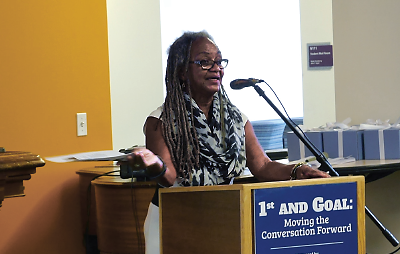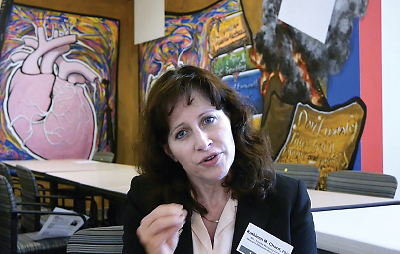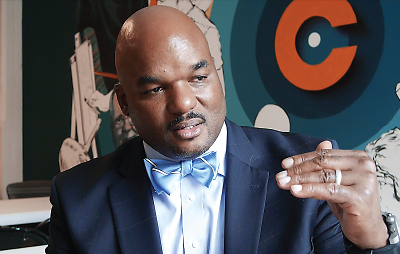Last month, APA’s Division of Diversity and Health Equity (DDHE) partnered with the Urban Greater Cincinnati Network on Mental Illness (UGCNOMI), a chapter of the National Alliance on Mental Illness, and the Ohio Psychiatric Physicians Association to discuss issues concerning the mental health care of ethnic and racial minority groups in the Cincinnati area.
“Currently, Cincinnati’s population is 50 percent minority,” said Gloria Walker, M.B.A., executive director of UGCNOMI, in welcoming the guests to the event titled “First and Goal: Moving the Conversation Forward.” She emphasized that Hispanic and black Americans endure a lack of care for mental health problems “due to cultural incompetence, language barriers, and stigma.”
The event was in celebration of the Bebe Moore Campbell National Minority Mental Health Awareness Month and APA’s Diversity Mental Health Month, a period dedicated to increasing public awareness of mental illness and the need for mental health care access among minority groups and other underserved populations (Psychiatric News, July 18).
“African Americans and Hispanic Americans are more likely to have posttraumatic stress disorder [PTSD] than any other group,” stated Kathleen Chard, Ph.D., director of the Trauma Recovery Center at Cincinnati Veterans Administration Medical Center, who was a panelist at the event.
According to Chard, PTSD is the fifth most diagnosed psychiatric disorder in the United States—affecting about 8 percent of the civilian population. She said that free mental health services for people with PTSD have been extended to civilian families in the Cincinnati area through the University of Cincinnati Stress Center, through funds provided by the Joey Votto Foundation. (Joey Votto, a Cincinnati Reds first baseman, established the foundation to provide evidence-based treatment for U.S. service members, veterans, and military families dealing with PTSD [Psychiatric News, February 28]).
After the event, Chard told Psychiatric News that one of the biggest challenges that the center faces in recruiting patients is stigma—an “all-too-often” experienced barrier that keeps people from accessing mental health services, according to the program’s keynote speaker, Dwight Hollier, L.P.C., director of the Transitions and Clinical Services (TCS) program for the National Football League (NFL).
“There is another layer [of stigma] when it comes to the NFL—the place of ‘machoness’ and manhood,” said Hollier, a former a linebacker for the Miami Dolphins. He explained that many NFL players end up dealing with mental health issues alone out of fear that seeking professional help will be viewed as a sign of weakness among their peers. He said that one of the toughest periods for a professional football player is the transition from being an active player to a retired one. The transition is made even more difficult for many players when their career has been cut short because of a serious physical injury, which can result in depression. According to Hollier, the NFL is addressing issues focusing on players’ mental distress through a project called Total Wellness, an initiative that uses a holistic approach to addressing players’ mental well-being.
“Total Wellness focuses on personal, physical, financial, and . . . emotional strength,” Hollier told Psychiatric News. In the aspect of the initiative focused on emotions and mental health, TCS personnel talk about mental health in a way that will resonate with professional athletes. Since 2013, utilization of the Total Wellness program has almost tripled, he said. The NFL “is tackling stigma by talking about mental health.”
The event wrapped up with participants brainstorming ideas on how to reduce stigma and increase behavioral health care access for members of minority populations. The consensus was that education is the key, and that means educating the public about mental illness as a way to combat stigma and about available resources in their community, so they know where to turn when they need mental health care.
“We are fortunate to have observed our first Diversity Mental Health Month with community leaders in Cincinnati and therapist and NFL great Dwight Hollier,” said APA Deputy Medical Director and DDHE Director Annelle Primm, M.D., M.P.H. “Through the collaboration, APA was able to raise awareness about mental health and break down barriers to care for not only racially diverse communities, but military personnel, veterans and their families, and professional athletes.” ■



